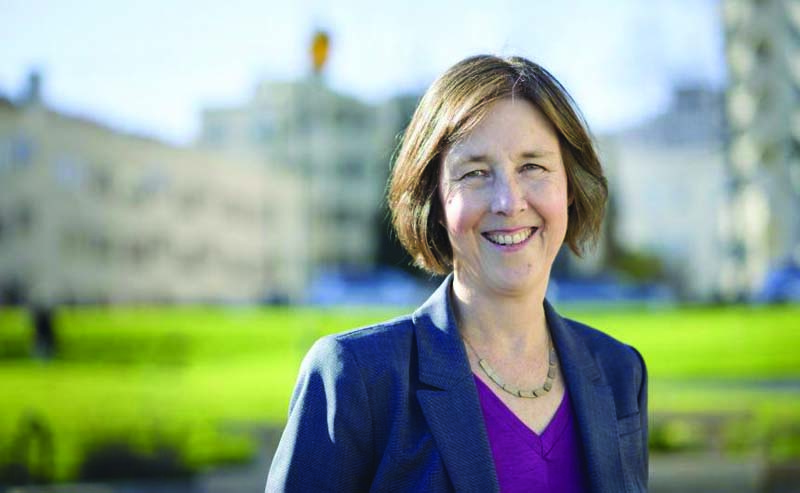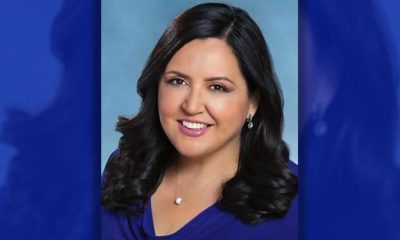Bay Area
Senator Nancy Skinner Provides Useful Guide to COVID-19 Financial Relief

After holding a teleconference Tuesday, Sen. Nancy Skinner released a wealth of information on how local community members and small business owners can access financial relief during the COVID-19 pandemic. Visit Sen. Skinner’s website.
Dear Constituent,
My telephone Town Hall on March 24 focused on financial relief actions that our state, federal, and local governments have taken to help those who’ve lost jobs or had hours reduced, small businesses that have had to close, and others that have been impacted by coronavirus/COVID-19.
Here’s a recap of the information relayed during the Town Hall, along with additional information about vital services that are available.
Tax deadlines: Both the state of California and the IRS have extended tax filing deadlines until July 15. However, if you are eligible for the federal EITC or Cal EITC and California’s child tax credit, filing your taxes before July 15 will help you get the benefit right away.
Property taxes: Contra Costa County and Alameda County tax assessors are working to waive late fees and penalties for those taxpayers facing economic hardship. Property tax revenue is very important to our counties to deliver services so if you’re able, please pay by April 10. If facing a hardship, go to your county tax assessor’s website for info on late fees/penalty waivers.
Federal stimulus package: The federal stimulus package, which is expected to be signed into law on March 27, includes a one-time payment of $1,200 to individuals who file a 2018 or 2019 return and earn an income of up to $75,000, or $2,400 payment for couples filing jointly with joint income of up to $150,000. In addition, those qualifying individuals or couples will also receive $500 per child. If your income as an individual is above $75,000 but below $99,000, or as a couple filing jointly above $150,000 but below $198,000, the amount of your check will be lower. Check federal websites for specifics.
Unemployment insurance: If you’ve lost your job or had your hours cut as a result of the crisis, apply online for unemployment insurance at EDD.ca.gov. Check here for eligibility.
The federal bill provides an extra $600 per week for up to four months for those receiving unemployment benefits. Under California law, many individuals, like Uber and Lyft drivers, who were treated by their employer as a 1099 or contract worker, are eligible for unemployment insurance, including the additional $600 federal payment because California law has reclassified many of these workers, even if the company that pays the worker has not done so yet. Legal Aid at Work provides details on this and more.
Disability insurance benefits (SDI): If you receive a W-2 from your employer, in most cases you have paid into the State Disability Insurance program (SDI). This program will provide disability insurance payments for those unable to work for more than eight days due to illness (such as COVID) or injury unrelated to your job. Check the Legal Aid at Work website for more information.
Paid family leave: Paid Family Leave provides benefits to Californians who need to take time off work to care for a seriously ill child, parent, parent-in-law, grandparent, grandchild, sibling, spouse, or registered domestic partner. Click here for more information.
Mortgages and foreclosures: Gov. Newsom announced that most major banks have agreed to allow residential property owners impacted by the crisis to miss mortgage payments for 90 days. In addition, the federal government suspended foreclosures and evictions to homeowners whose mortgage is guaranteed by Fannie Mae or Freddie Mac or is backed by the FHA or HUD. See HUD PDF for info on the federal program: foreclosure and eviction moratorium. Updates will be posted here.
Tenant evictions: Both Alameda County and Contra Costa County sheriffs’ offices have halted eviction proceedings during the crisis. In addition, some local cities, including Albany, Berkeley, and Emeryville, have enacted ordinances temporarily barring evictions and in some cases rent increases for renters and small businesses impacted by the crisis. Check each city’s website to see what measures they’ve put in place
Small business help: The U.S. Small Business Administration (SBA) is offering low-interest, long-term federal disaster loans to California small businesses, rental property owners, and private nonprofit organizations with no payments required for the first 12 months. Applicants may apply online.
Energy and Communications: PG&E and our local Community Choice energy providers have suspended shutoffs during the crisis. Also, most cellphone carriers and internet providers have signed the Federal Communications Commission (FCC) pledge to provide certain benefits during the COVID-19 emergency. The pledge requires companies to keep providing service to people unable to pay their bills due to the COVID-19 pandemic, waiving certain fees, and easing data restrictions to allow consumers to freely use data during the emergency.
Student Loans: As of March 20, 2020, the federal government has temporarily suspended the interest it collects on student loans, and federal lenders are letting borrowers suspend their student loans and loan payments without penalty for the next 60 days.
Parking enforcement: Many cities in our area have suspended parking enforcement. Go to your city’s website to see what your city has done on parking enforcement, extending business license deadlines, and more.
Relief Funds: Oakland and Berkeley have established relief funds for those impacted by the crisis. To find out what the funds support, and how you can contribute, go to https://www.oaklandfund.org/ and https://berkeleyrelieffund.org/
Medi-Cal/CalWORKs recipients: Gov. Newsom waived the 90-day annual redetermination reviews for Californians enrolled in Medi-Cal and CalWORKs. So, if you are currently enrolled in Medi-Cal or CalWORKs, rest assured your benefits will continue through June 16. If your Medi-Cal benefits were already terminated, you have to reapply.
New Medi-Cal applicants: The state has expedited Medi-Cal for new applicants, waiving certain paperwork requirements including citizenship docs. Homeless individuals just need to state on application that they are homeless and will be expedited. All applications can be done through the Covered California website.
CalFresh: If you qualify for and need CalFresh food assistance benefits (the state’s food stamp program), applications can be done online, at GetCalFresh.org. If you are already receiving CalFresh, you will keep your coverage through May and won’t need to be recertified.
Immigration rights: If you’re impacted by the crisis due to your immigration status, please see the Legal Aid at Work website for more information on how to get help.
More detailed information on, for example, unemployment insurance and disability insurance and who qualifies as well as the assistance available to small businesses from the US Small Business Administration, was provided during my March 24 Town Hall. My office will post an audio recording of the Town Hall on my website as soon as it’s available.
Please stay safe and practice the good direction from our public health experts to maintain 6-feet of distance when you are out for shopping or other legitimate needs, and wash your hands — soap and water is most effective!
Sincerely,
Nancy Skinner
Senator, 9th District
Activism
Oakland Post: Week of December 31, 2025 – January 6, 2026
The printed Weekly Edition of the Oakland Post: Week of – December 31, 2025 – January 6, 2026

To enlarge your view of this issue, use the slider, magnifying glass icon or full page icon in the lower right corner of the browser window.
Activism
Big God Ministry Gives Away Toys in Marin City
Pastor Hall also gave a message of encouragement to the crowd, thanking Jesus for the “best year of their lives.” He asked each of the children what they wanted to be when they grow up.

By Godfrey Lee
Big God Ministries, pastored by David Hall, gave toys to the children in Marin City on Monday, Dec. 15, on the lawn near the corner of Drake Avenue and Donahue Street.
Pastor Hall also gave a message of encouragement to the crowd, thanking Jesus for the “best year of their lives.” He asked each of the children what they wanted to be when they grew up.
Around 75 parents and children were there to receive the presents, which consisted mainly of Gideon Bibles, Cat in the Hat pillows, Barbie dolls, Tonka trucks, and Lego building sets.
A half dozen volunteers from the Big God Ministry, including Donnie Roary, helped to set up the tables for the toy giveaway. The worship music was sung by Ruby Friedman, Keri Carpenter, and Jake Monaghan, who also played the accordion.
Big God Ministries meets on Sundays at 10 a.m. at the Mill Valley Community Center, 180 Camino Alto, Mill Valley, CA Their phone number is (415) 797-2567.
Activism
First 5 Alameda County Distributes Over $8 Million in First Wave of Critical Relief Funds for Historically Underpaid Caregivers
“Family, Friend, and Neighbor caregivers are lifelines for so many children and families in Alameda County,” said Kristin Spanos, CEO, First 5 Alameda County. “Yet, they often go unrecognized and undercompensated for their labor and ability to give individualized, culturally connected care. At First 5, we support the conditions that allow families to thrive, and getting this money into the hands of these caregivers and families at a time of heightened financial stress for parents is part of that commitment.”

Family, Friend, and Neighbor Caregivers Can Now Opt Into $4,000 Grants to Help Bolster Economic Stability and Strengthen Early Learning Experiences
By Post Staff
Today, First 5 Alameda County announced the distribution of $4,000 relief grants to more than 2,000 Family, Friend, and Neighbor (FFN) caregivers, totaling over $8 million in the first round of funding. Over the full course of the funding initiative, First 5 Alameda County anticipates supporting over 3,000 FFN caregivers, who collectively care for an estimated 5,200 children across Alameda County. These grants are only a portion of the estimated $190 million being invested into expanding our early childcare system through direct caregiver relief to upcoming facilities, shelter, and long-term sustainability investments for providers fromMeasure C in its first year. This investment builds on the early rollout of Measure C and reflects a comprehensive, system-wide strategy to strengthen Alameda County’s early childhood ecosystem so families can rely on sustainable, accessible care,
These important caregivers provide child care in Alameda County to their relatives, friends, and neighbors. While public benefits continue to decrease for families, and inflation and the cost of living continue to rise, these grants provide direct economic support for FFN caregivers, whose wages have historically been very low or nonexistent, and very few of whom receive benefits. As families continue to face growing financial pressures, especially during the winter and holiday season, these grants will help these caregivers with living expenses such as rent, utilities, supplies, and food.
“Family, Friend, and Neighbor caregivers are lifelines for so many children and families in Alameda County,” said Kristin Spanos, CEO, First 5 Alameda County. “Yet, they often go unrecognized and undercompensated for their labor and ability to give individualized, culturally connected care. At First 5, we support the conditions that allow families to thrive, and getting this money into the hands of these caregivers and families at a time of heightened financial stress for parents is part of that commitment.”
The funding for these relief grants comes from Measure C, a local voter-approved sales tax in Alameda County that invests in young children, their families, communities, providers, and caregivers. Within the first year of First 5’s 5-Year Plan for Measure C, in addition to the relief grants to informal FFN caregivers, other significant investments will benefit licensed child care providers. These investments include over $40 million in Early Care and Education (ECE) Emergency Grants, which have already flowed to nearly 800 center-based and family child care providers. As part of First 5’s 5-Year Plan, preparations are also underway to distribute facilities grants early next year for child care providers who need to make urgent repairs or improvements, and to launch the Emergency Revolving Fund in Spring 2026 to support licensed child care providers in Alameda County who are at risk of closure.
The FFN Relief Grants recognize and support the essential work that an estimated 3,000 FFN caregivers provide to 5,200 children in Alameda County. There is still an opportunity to receive funds for FFN caregivers who have not yet received them.
In partnership with First 5 Alameda County, Child Care Payment Agencies play a critical role in identifying eligible caregivers and leading coordinated outreach efforts to ensure FFN caregivers are informed of and able to access these relief funds.FFN caregivers are eligible for the grant if they receive a child care payment from an Alameda County Child Care Payment Agency, 4Cs of Alameda County, BANANAS, Hively, and Davis Street, and are currently caring for a child 12 years old or younger in Alameda County. Additionally, FFN caregivers who provided care for a child 12 years or younger at any time since April 1, 2025, but are no longer doing so, are also eligible for the funds. Eligible caregivers are being contacted by their Child Care Payment Agency on a rolling basis, beginning with those who provided care between April and July 2025.
“This money is coming to me at a critical time of heightened economic strain,” said Jill Morton, a caregiver in Oakland, California. “Since I am a non-licensed childcare provider, I didn’t think I was eligible for this financial support. I was relieved that this money can help pay my rent, purchase learning materials for the children as well as enhance childcare, buy groceries and take care of grandchildren.”
Eligible FFN caregivers who provided care at any time between April 1, 2025 and July 31, 2025, who haven’t yet opted into the process, are encouraged to check their mail and email for an eligibility letter. Those who have cared for a child after this period should expect to receive communications from their child care payment agency in the coming months. FFN caregivers with questions may also contact the agency they work with to receive child care payments, or the First 5 Alameda help desk, Monday through Friday, from 9 a.m. to 5:00 p.m. PST, at 510-227-6964. The help desk will be closed 12/25/25 – 1/1/26. Additional grant payments will be made on a rolling basis as opt-ins are received by the four child care payment agencies in Alameda County.
Beginning in the second year of Measure C implementation, FFN caregivers who care for a child from birth to age five and receive an Alameda County subsidized voucher will get an additional $500 per month. This amounts to an annual increase of about $6,000 per child receiving a subsidy. Together with more Measure C funding expected to flow back into the community as part of First 5’s 5-Year Plan, investments will continue to become available in the coming year for addressing the needs of childcare providers in Alameda County.
About First 5 Alameda County
First 5 Alameda County builds the local childhood systems and supports needed to ensure our county’s youngest children are safe, healthy, and ready to succeed in school and life.
Our Mission
In partnership with the community, we support a county-wide continuous prevention and early intervention system that promotes optimal health and development, narrows disparities, and improves the lives of children from birth to age five and their families.
Our Vision
Every child in Alameda County will have optimal health, development, and well-being to reach their greatest potential.
Learn more at www.first5alameda.org.
-

 Alameda County4 weeks ago
Alameda County4 weeks agoSeth Curry Makes Impressive Debut with the Golden State Warriors
-

 Bay Area3 weeks ago
Bay Area3 weeks agoPost Salon to Discuss Proposal to Bring Costco to Oakland Community meeting to be held at City Hall, Thursday, Dec. 18
-

 Activism3 weeks ago
Activism3 weeks agoMayor Lee, City Leaders Announce $334 Million Bond Sale for Affordable Housing, Roads, Park Renovations, Libraries and Senior Centers
-

 Activism3 weeks ago
Activism3 weeks agoOakland Post: Week of December 10 – 16, 2025
-

 Activism3 weeks ago
Activism3 weeks agoOakland School Board Grapples with Potential $100 Million Shortfall Next Year
-

 Arts and Culture3 weeks ago
Arts and Culture3 weeks agoFayeth Gardens Holds 3rd Annual Kwanzaa Celebration at Hayward City Hall on Dec. 28
-

 Activism3 weeks ago
Activism3 weeks ago2025 in Review: Seven Questions for Black Women’s Think Tank Founder Kellie Todd Griffin
-

 Advice3 weeks ago
Advice3 weeks agoCOMMENTARY: If You Don’t Want Your ‘Black Card’ Revoked, Watch What You Bring to Holiday Dinners




























































